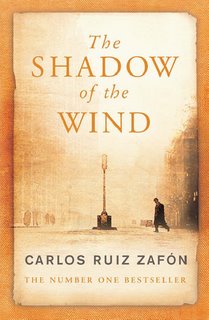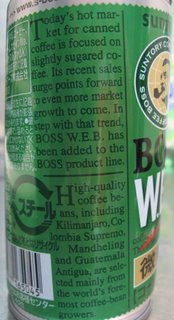Book Review: --The Shadow of the Wind-- by Carlos Ruiz Zafón
 ~Despite my busy work schedule, I've found the time to finish a few novels this year. One of the best I've read so far has been "The Shadow of the Wind" by Spanish author Carlos Ruiz Zafón (the original title is "La Sombra del Viento").
~Despite my busy work schedule, I've found the time to finish a few novels this year. One of the best I've read so far has been "The Shadow of the Wind" by Spanish author Carlos Ruiz Zafón (the original title is "La Sombra del Viento")."The Shadow of the Wind" is a book for those who love books. The story takes place in postwar Barcelona, Spain, where a young boy named Daniel is taken by his father to a fantastic place called the "Cemetery of Lost Books", where books lost to the rest of the world are preserved. Daniel is allowed to take one book with him, and chooses "The Shadow of the Wind" by an obscure author named Julian Carax.
Daniel's choice of book has a massive influence on his life. His attempts to learn more about the author are at first fruitless, and other people seem to take an undue interest in Daniel's choice of reading. Daniel finds himself pulled into a world of intrigue and danger as he digs deeper into the mystery surrounding Julian Carax. For me, the lines became blurred between the actual book that I was reading and the titular novel-within-the-novel, to the point that I had to actually look in the book to remember the actual author (Zafón), rather than the fictitious author (Carax).
It's great stuff, really, in the vein of "The Da Vinci Code" with infinitely better writing. The characters are superbly realized and actually develop, unlike a certain symbolologist and his albino nemesis. Another interesting aspect of "The Shadow of the Wind" is the setting. Most of the book takes place in Barcelona, but the city as described feels so incredibly real. It's a fascinating city of mist and decay, where a war-weary population lives out their lives in a sort of vague fear/detachment from the fascist regime of General Francisco Franco. The city really does come alive within the pages of the book.
Bear in mind that the book I read was an English translation from the original Spanish. I'm a bit leery of translations, but Lucia Graves, the translator, has done an absolutely stellar job. The prose flows along like a swift-flowing river and retains its lyrical, metaphor-loaded style. I especially like how the translation manages to retain the sense of dry humor that pervades the book.
If there's one flaw in the book, it's that it uses italicized flashback sequences in several places to reveal large portions of the backstory. The omniscient 3rd-person viewpoint of these flashbacks was a bit too revealing; I think revealing crucial plot details through the characters' own discoveries and actions would have been a bit more effective in drawing the reader deeper into the multiple mysteries that intertwine in the novel. Still, the paperback tops out at 506 pages, so perhaps the author was merely attempting to accelerate the plot and keep it from dragging out to much.
To summarize, the cover lists "The Shadow of the Wind" as a #1 bestseller, and it's a reputation well-deserved. If you like mysteries (calling all Dan Brown fans!) loaded with heavy doses of excellent writing, realistic characters, and a fascinating setting, then check out The Shadow of the Wind.
~Oyasumi!





